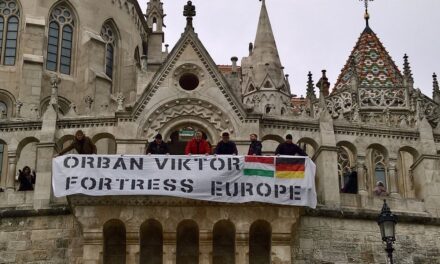All three proposals of the European Commission failed, and in the case of gas sanctions, the German and Hungarian positions based on common sense prevailed, but it is certain that they will not give up in Brussels, Zoltán Kiszelly, director of the Center for Political Analysis of the Századvég Foundation, told Origo evaluating the results of the EU summit in an interview. According to Kiszelly, a hot autumn should be expected in countries that support sanctions and war.
The first day of the EU summit in Brussels ended at two in the morning on Friday. Prime Minister Viktor Orbán announced on his Facebook page that even if there is a gas price cap, Hungary will be exempted from it, so it will not endanger the safe gas supply of our country, and even if there is joint gas procurement in Europe, it will not be mandatory for us. Why is this success important for Hungary?
This can be considered a huge success because
THE ENERGY SUPPLY OF THE HUNGARIAN POPULATION AND INDUSTRY WILL CONTINUE TO BE SECURED, AND THERE IS NO THREAT OF ENERGY SHORTAGE. THERE WILL BE BOTH OIL AND GAS, AND AN IMPORTANT RESULT IS THAT, AS A COUNTRY WITHOUT A SEA PORT, WE GOT AN EXEMPTION FOR GAS AFTER CONDUCTED OIL, SO WE MANAGED TO PRESERVE THE EUROPEAN UNITY.
Here, in the field of energy, we have a price problem and not a supply problem, as in many parts of Western Europe. The Brussels sanctions, which have already been accepted and – as with gas, are regularly imposed – drive up prices in our country, so we can rightly speak of sanctioned inflation.
THE EUROPEAN COMMISSION'S GAS SANCTIONS PROPOSALS HAVE COMPLETELY FAILED BECAUSE THE GERMANS SWEEPED ALL THREE OFF THE TABLE.
On the issue of gas sanctions, the Hungarian and German positions are very close to each other, because they finally have the interests of German industry and the Hungarian jobs connected to it in mind. Against the pro-sanctions Hungarian left and the pro-war German Greens, we managed to make an important step forward in protecting jobs in the German and Hungarian production sectors. This is a huge success for Hungary and, of course, for the German economy as well.
The Commission had three more ill-considered sanction proposals.
The first was the gas cap, which, if accepted, would mean that the Russians would not supply gas to Europe. This is clear, but it is also important to remember that not only the Russians, but also the Qataris, the Americans and the Norwegians would not give gas cheaper than the market price. That is why the price cap is a suicidal idea. Berlin rejects this.
The second thing the French wanted (during the negotiation, French President Macron even kept German Chancellor Olaf Scholz waiting for a quarter of an hour in an extremely impolite manner) was to take out a joint loan for utility subsidies. The Germans did not support this proposal either. This makes it easier to understand why the reconstruction money is not given to the Poles, and why the Germans said that the unused money should be transferred. What, for example, is not given to the Poles and to us, and what thus "sticks inside". According to them, these funds should be used to support indebted southern countries, such as France and Italy, in the reduction of utilities. The Germans avoided this as much as possible, they are doing well with their 200 billion.
And the third proposal is the joint purchase of gas, which makes no sense, because they could only buy such large quantities from the Russians. But I want to avoid that.
A word like a hundred: all three of the Commission's proposals failed, unprepared and bad proposals were made, and we see that
THE GERMAN AND HUNGARIAN POSITIONS WHICH REJECT GAS SANCTIONS, WHICH STAND ON THE SOIL OF SANE, HAVE ROUNDED UP, BUT IT IS CERTAIN THAT THEY WILL NOT CONTINUE TO GIVE UP IN BRUSSELS. THAT'S ALL ABOUT HOW "ISOLATED" VIKTOR ORBÁN AND THE HUNGARIAN POSITION ARE IN EUROPE.
Pro-sanction, globalist politicians do not represent the interests of the people, but those of the pro-globalist war and sanctions elite. The energy shortage is due to the sanctions, and the sanctions inflation is because they gave up on cheap Russian energy and because of that there was a severe energy shortage. They cannot buy fertilizer, medicine, diesel, construction material, packaging material, etc. in the previous quantity. produce. It shows up in food prices, in utility costs, and that's why people are worried about how they're going to be able to pay for it all, and that's where governments fall into. It can be seen, that
IN THE BRITISH FOLLOWING THE RESIGNATION OF LIZ TRUSS, THE FIGHT IS GOING ON TO PREVENT NEW ELECTIONS BEING CALLED, BECAUSE THEN PEACE PARTIES MAY BE IN THE MAJORITY, OR AT LEAST THOSE WHO ARE NOT AS COMMITTED WAR PARTIES.
This also happened in Slovakia: the coalition almost fell apart due to the war, but in the end they reached an agreement because they were afraid that the people would choose a pro-peace government instead. Presumably, this was achieved due to the pressure of globalist forces, and this can be expected in the United Kingdom as well.
Staying with the British: their economy is now in a serious situation,
AT LEAST A THIRD OF PEOPLE THINK ABOUT WHETHER YOU'D BETTER EAT OR HEAT, AND IF THEY CAN'T ACHIEVE CHANGE POLITICALLY, THEN THERE WILL CERTAINLY INCREASINGLY MORE AND VIOLENT PROTESTS.
We saw the mass protests in Berlin, Rome, Vienna and the Netherlands during Covid, and we are seeing them now in Prague, Vienna and all over Germany. The violence appears when the demonstrators feel that they cannot replace the pro-war forces peacefully, because the globalist elites keep them in power, and thus make them, the people, pay the price of the war.
Source: Origo
Featured image: Szilvia Polgári













